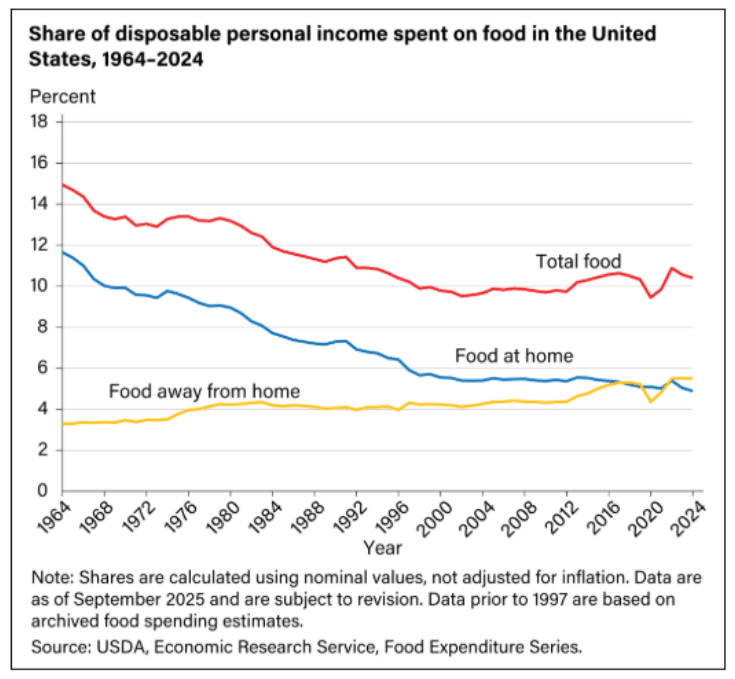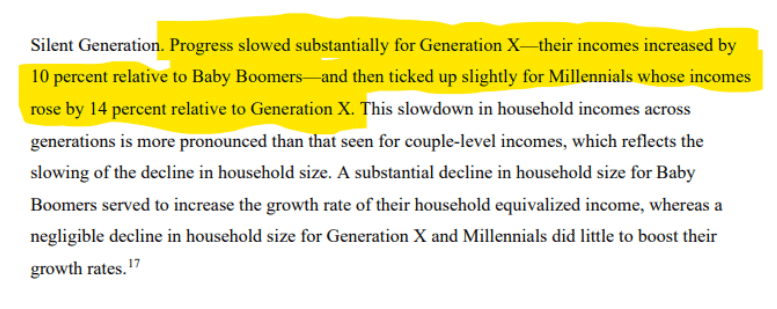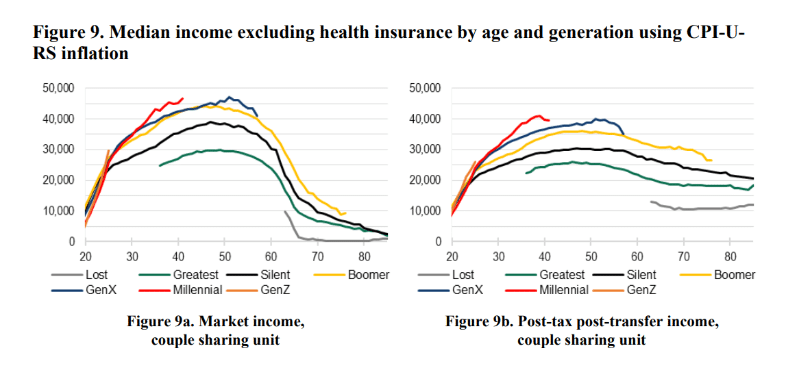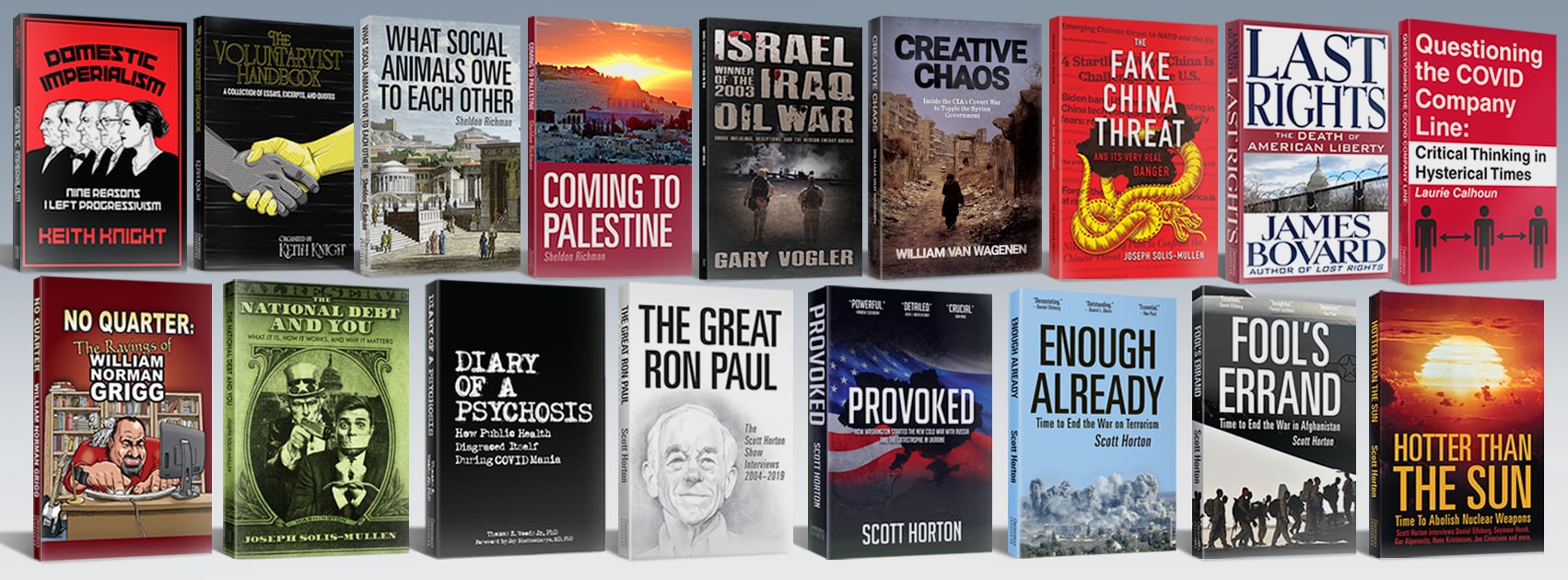John Stossel is on a constant mission to tell Millennials and Zoomers that they’ve got it way better than their parents ever did.
Stossel breathlessly tells us in an October 1 Reason magazine article, “Today, Americans actually spend a smaller percentage of our money on food, clothing, and housing than we used to, according to Bureau of Labor Statistics survey data.”
Well, that is how it’s supposed to be under a free market economy. But is our economy a free market? And are young people spending less?
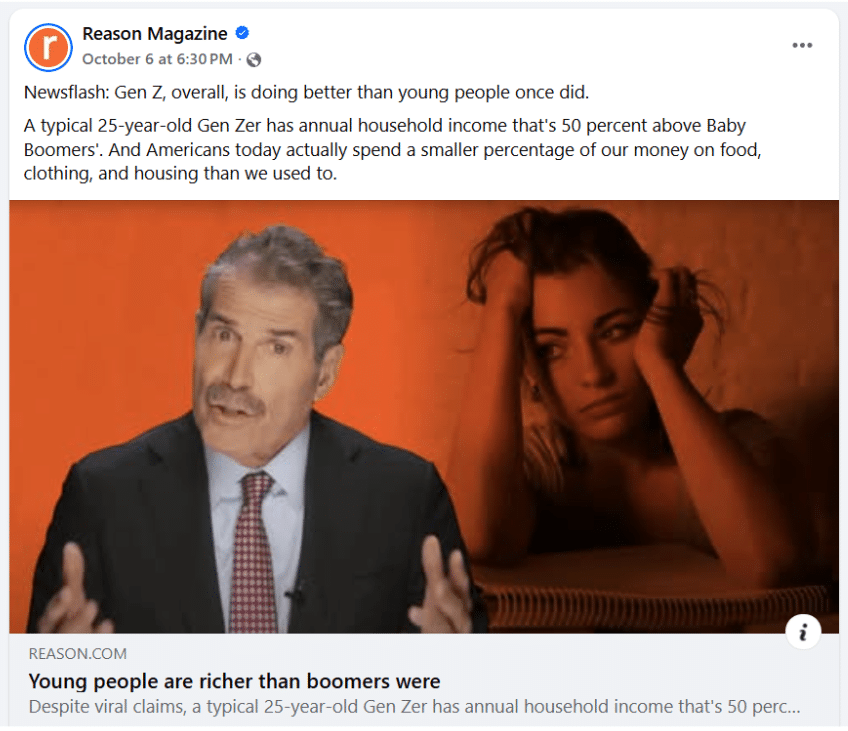
It depends a lot on how you slice the data. Every aspect of the Facebook post above, which accurately quotes the Reason article, is gravely misleading. Sure, of course 25-year olds are spending less on housing and food…because they’re living in their parents’ basement. Young people aged 25-34 owning homes used to be more than 50% of households back in 1980, but home ownership rate for that demographic has fallen precipitously to 33%. Mommy and daddy’s rent is cheap for their 30-year-old children still living at home, and their food is cheap too.
Stossel’s article relies (through a secondary source) on a Federal Reserve Bank working paper that ironically documents the increasing reliance of Gen Z on their parents for room and board, as evidenced by this chart in the working paper’s appendix.
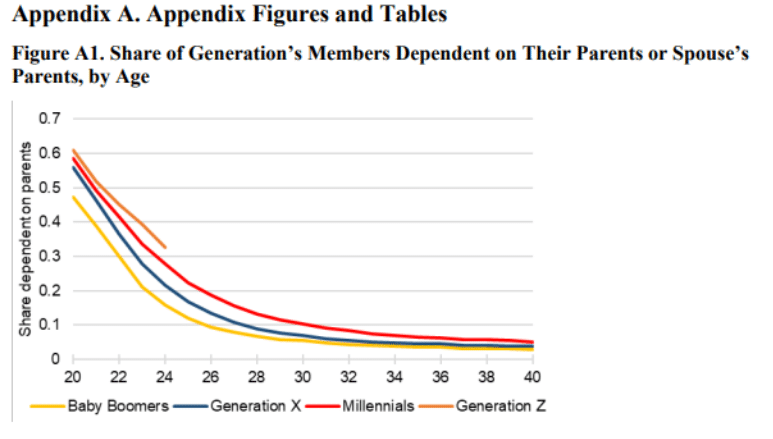
Mom and dad’s rent may be cheap and the food may be good, but that doesn’t mean Gen Z is living higher on the hog than previous generations. If there’s so much generational economic progress, why is Gen Z more likely to live in their parents’ home and more likely to have a roommate than their Gen X parents did in the 90s?
Stossel says in his article that “Yes, homes cost more now, but census data show more Americans own their homes now than when I was a kid.” This is also technically true but only because John Stossel is a senior citizen at 78-years old. Overall housing ownership rates are a bit lower than they were in 1980, according to the U.S. Census Bureau. That’s a forty-five year losing streak Stossel conveniently missed.
St. Louis Fed economist Victoria Gregory, who wrote the working paper, acknowledged:
“I found that newer generations were less likely to own homes at similar ages compared to older generations, and that was true regardless of whether or not one had a college degree…So, it seemed like, interestingly, even though college [degreed] workers were earning similar amounts to previous generations, they were still less likely to own homes.”
Stossel claims “Gen Z, overall, is doing better than young people once did.” And maybe they are, a bit, if they really love their parents’ company and their mom’s a good cook.
Like with housing, the longstanding fall in spending on food from generation-to-generation has arrested completely since the mid-1990s. The U.S. Department of Agriculture reports that the decline in food prices as a percentage of income stopped in the mid-1990s.
That claimed generational economic progress depends a lot upon how it’s measured. Stossel and the Federal Reserve Bank working paper he indirectly relied upon use the most flattering inflation adjustment; a hard look at the data shows Millennials and Zoomers have likely flatlined in terms of overall economic progress.
The Federal Reserve paper notes that it was “adjusting for inflation using the Personal Consumption Expenditures (PCE) price index, which like the Chained Consumer Price Index (Chained CPI) better reflects price changes than the traditional Consumer Price Index (CPI-U).” In other words, they use the statistic that counts cumulative inflation at 30% less than the CPI since the United States left the gold standard in 1971. Using the PCE measurement undercounts the basket of goods that people actually need to purchase, as measured in the CPI. Since the year 2000, the gap between the CPI and PCI is 9.75%, which constitutes the majority of the claimed “progress” claimed for Zoomers over Millennials.
And the Fed’s working paper also acknowledges in charts that this slowed progress to near zero since the Boomer generation when you measure inflation by the CPI.
What the above charts show is that generational progress went from very brisk among the Greatest, Silent, and Boomer generations to glacial for Gen X, Millennials, and Zoomers. And the above chart excludes the rising and chokingly high cost of health insurance, which further reduces the generational benefits since Gen X.
Stossel cherry-picked Boomers as a base metric, rather than Zoomers’ Gen X parents, because everyone knows there was lots of steep economic progress for the middle class in America up until 1971, the year the dollar was fully separated from gold. It pads his optimistic everything-is-awesome message about income increasing “50 percent” since the Boomers. But most of that 50% marker disappears if you use the CPI instead of PCE.
The point of all this data is not to imply the middle class is disappearing. It’s not. But its progress upward has been paralyzed by wage theft through inflation and skyrocketing housing prices through interest rate manipulation, both by the Federal Reserve Bank and a doubling of payroll taxes for Social Security and Medicare paid by working people between 1965 and 1990. Stossel ignores these massive systemic robberies from younger generations entirely.
Stossel says his Pollyanniac optimism is necessary to thwart the evil progressive/socialist alliance. “It’s part of progressives’ campaign for socialism,” he writes. “They tell young people: Not only does capitalism foster greed, inequality, etc., but it doesn’t even deliver the goods.” Stossel has long told us that the rich pay most of the income taxes, implying that billionaires are unfairly persecuted in America, even though a more important truth is that labor is taxed at twice the rate of capital at every income level.
Stossel’s Reason magazine, and a host of other rightwing and libertarian groups like the Cato Institute and the American Enterprise Institute tell us urgently, incessantly, and in Pollyannaic terms that it’s important we know capitalism has resulted in economic progress and that billionaires are an oppressed minority paying nearly all the taxes. Not coincidentally, all of the above-named organizations are funded primarily by a handful of politically-connected billionaires and their foundations.
Stossel’s essentially arguing “you poors have never had it so good, so you should just accept the status quo where you’re robbed and the system is rigged against you.” That billionaire agit-prop rankles me. It’s articles like Stossel’s that have convinced me not to bother to oppose socialism any more.
Stossel and the rest of the billionaire-funded, ideological-industrial complex contend the market is the reason people have gotten wealthier over the past two centuries. I won’t argue with that. But it’s a message that solves as many modern problems as a campaign warning rain causes wet streets.
The most important point to remember in American politics is this: Billionaires control both political parties, the right and left side of the debate, and they don’t want socialism. They want profits, and that means private property under a form of capitalism. Both parties in America’s duopoly, from the crony capitalists Elon Musk and Peter Theil on the right to the Senator “Capitalist to my bones” Elizabeth Warren on the left back some form of capitalism and markets. “Capitalism” is not in the slightest bit controversial in mainstream American political circles, nor is it globally.
The socialist Mayor-elect of New York City Zohran Mamdami—the new bugbear of the right—is not a threat to the American economy; at worst he will become a zoo creature serving as an example not to be let loose on a larger public. Mamdami only survived the New York City primary because the political establishment ran serial sexual harasser Andrew Cuomo against him. But even if he successfully establishes city-run grocery stores, it’ll become yet another example of how city-run grocery stores have always lost money and failed.
Socialism is not popular in America, and never will be. Even the Democrats who say they believe in “socialism” think it means a social safety net, not government ownership of the means of production. And Republicans believe in an almost identical social safety net.
Stossel and the rest of the billionaire-funded ideological-industrial complex think that by lying to Millennials and Zoomers and telling them they’re better off than their parents they’re forestalling widespread adoption of socialist principles among the youth. But there’s no evidence they would ever have embraced socialism, and indeed it’s deception like Stossel’s nonsense that just might be the only thing that could ever push them over toward socialism. The irony is libertarians are going to lose another whole generation by telling Gen Z they have it better than their parents when Gen Z knows from hard reality it’s not true. Like the Joe Biden administration telling voters that the economy was strong in 2024, when real median wages had fallen during his presidency, constant propaganda can never overcome an overwhelming economic reality. It’ll never work telling Zoomers, if I may summarize the message, “You’re doing better than your parents, or you’re just eating too much avocado toast and pricey coffee shop lattes.”
The threat from socialism in America is a phantasm. Nobody is going to nationalize the steel industry, or any other major industry. Socialism as a political bogeyman has largely been employed as a campaign wedge issue by Republicans who claim without evidence that Democrats favor socialism.
On the other hand, the threat from vampyric cronyism—from what used to be called economic “fascism” in the 1930s and 1940s — is very real and palpable. This fascism, not socialism, is the root cause of the stagnating middle class, and fascism is an ideology that embraces a semi-free, or at least fully “private” market of sorts. Sure, it has the subsidies and regulations that politically-connected billionaires demand to enrich themselves, and both the Democrats and Republican politicians embrace this fascism with its subsidies and regulations for billionaires enthusiastically. But fascism is fully “capitalist” in the capitalism-socialism dialectic.
Trump’s political rise should be a powerful lesson for libertarians. Trump was always a self-absorbed, philandering New York Democrat billionaire who never cared about regular people. But he struck a powerful political vein simply by publicizing the truth that economic progress had stopped for the middle class. Trump visited rust belt states and told them some truths that the government had created their problems. That he lied about fixing them didn’t matter politically. Trump didn’t have to do a thing to cure the regulatory and tax system bleeding of the middle class to succeed electorally. Just acknowledging what most Americans are living through sent him from his Mar-a-Lago mansion to the White House, and almost exclusively on the votes of the working poor and middle class.
The tone-deaf message by the Beltway’s ideological-industrial complex is a losing message for libertarians, both politically and culturally. They need to stop opposing socialism by saying “everything is better now.”
It’s not better.
It’s time to stop the Cold War mentality that socialism is poised to take over. It’s not 1986 any more, there’s no mass socialist movement, and Ronald Reagan is not still in the Oval Office. Even China has done a lot of privatization. Instead, let’s start acknowledging that fascism has arrested the economic progress of the majority of Americans and transferred that wealth to the billionaire class. And it doesn’t matter whether you label it fascism, cronyism, subsidies, bureaucracy, BigPharma, the Federal Reserve Bank, the military-industrial complex, BigAg or some new term. This fascism, or whatever you call it, is the primary threat to genuinely free markets and economic progress for working people.



